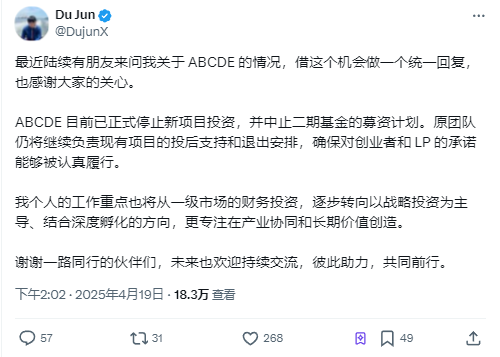Yesterday, Du Jun released a tweet about ABCDE stopping new project investments and second-round fundraising, which sparked extensive discussion and pessimism.

Boss Du pointed out the core issue: the value creation mechanism in the primary market has gone wrong. I believe this is not just the disappointment of Boss Du alone, but represents the exhaustion, anxiety, and even confusion of many practitioners.
As a long-term "airdrop user" and can be considered a 1.5-level long-term participant, I want to discuss this from another perspective: The problems we see today are actually a delayed but imminent supply-side reform crisis.
_________
I. Airdrop Credit Collapse, Asset Supply Mechanism Systematically Failing
Recently, I had to embark on the path of rights protection, frankly, as a last resort.
Once, airdrops were the most revolutionary and idealistic institutional innovation in the crypto world. It was not a copy of traditional IPO, but an attempt to prioritize consensus over price, establishing a decentralized original order through token distribution.
It activated communities and drove ecosystems, and was once a symbol of "permissionless entrepreneurship".
But now, airdrops have become a "carefully orchestrated script": VCs determine valuation, project parties write rules, market makers prepare to sell; airdrops have become the "last meal" before TGE; not distributed to launch the ecosystem, but to provide exit liquidity.
Airdrops have fallen from a "trust distribution mechanism" to a "capital's chip clearance mechanism".
Many blame airdrop hunters, script users, and workshops, but this is putting the cart before the horse. The emergence of airdrop hunting is not because the airdrop mechanism was abused, but because it lost its premise of being trusted, and people began to vote with their feet and arbitrage.
The "project party-VC-workshop" triangular conflict is just a surface phenomenon; the real problem is that the entire initial supply structure's incentive mechanism has been severely distorted.
The most serious consequence is that the collapse of airdrop credit has led to a deeper result: the trust bridge between the primary and secondary markets is completely breaking.
This is no longer about individual projects "failing", but the asset supply mechanism on the chain itself is facing a structural collapse.
_________
II. Valuation Model Failure: Using the Wrong Ruler Naturally Fails to Measure Value
Traditional primary market valuation revolves around the "project growth logic": once the product is made, with high user adoption and a clear commercialization path, pricing and exit become natural.
But crypto is not this kind of game.
Crypto projects are not enterprises, but a combination of on-chain mechanisms: an asset generation logic, a trading and game structure, and a system of power and revenue distribution.
It does not rely on cash flow, but on liquidity;
It does not depend on user growth, but on user-initiated trading;
It does not exit through acquisition or listing, but realizes value through circulation and governance rights gaming.
Therefore, you will see such contrasting phenomena:
Some projects have impressive user data and social heat, with FDV skyrocketing on TGE day, then plummeting to zero;
While some "mechanism prototypes" with almost no interface, no community, no whitepaper, suddenly attract massive TVL and become new kings of the secondary market.
Why? Because in Web2, value is created through "usage", while in Crypto, pricing is achieved through "exchange".
The fundamental difference is that Web2 is an information internet, aiming to connect people with services; Crypto is a value internet, aiming to connect assets with markets. Everything existing on-chain, whether tokens, protocols, rules, identity systems, or trading venues, ultimately exists to optimize value flow, shorten transaction paths, and reduce trust costs.
So we evaluate a crypto project not by what features it has, but by whether it can construct markets, trigger gaming, and stimulate liquidity.
This is the true "product power" of Crypto.
Many projects are still copying the Web2 "platform + application" thinking to build ecosystems: having a chain, wallet, task system, social features, Launchpad, seemingly "fully prepared", but actually "without any trading", and their eventual collapse is "unsurprising".
History tells us: The success of crypto projects has never been about what they "can do", but what they "can inspire the market to do".
Only mechanisms that can create sustained trading liquidity are the true moat.
_________
III. The Essence of Supply-Side Reform: From Distributing Tokens to Creating Sustainable Tradable Mechanisms and Assets
Boss Du says he doesn't want to participate in games that end "with going online".
I want to say that as repeatedly consumed users, we also don't want to keep playing the role of "bag holders of air consensus" and reluctant rights protectors.
Today's market is no longer short of funds, technology, or talent, but lacks a truly crypto-compatible asset supply system:
The airdrop mechanism must be reconstructed, returning to the original intent of "incentivizing real behavior and establishing verifiable trust";
Valuation logic must be innovated, completely breaking free from Web2's linear thinking of "product-growth-revenue";
Ecosystem construction must be rewritten, shifting from feature stacking to mechanism collaboration and liquidity self-organization;
The VC role must be reshaped, moving from investing in projects to becoming "co-builders of tradable mechanisms".
This industry lacks functional products and narrative builders, but needs mechanism innovation; this is the "productivity" of the crypto world and the seed of the next bull market.
The supply-side reform in the crypto world has actually been ongoing, but everyone is just realizing it late. The industry has created DeFi, DEX, launchpads...... What will be created next? This is a question all builders and investors must rethink.
But undoubtedly, true change has indeed begun. As airdrop users, we can only patiently wait and try to survive, stay long-term at the table, and avoid becoming cannon fodder of the era's transformation.







